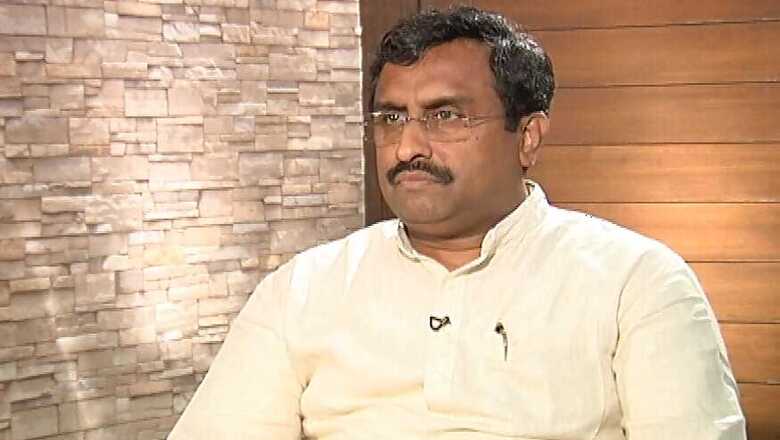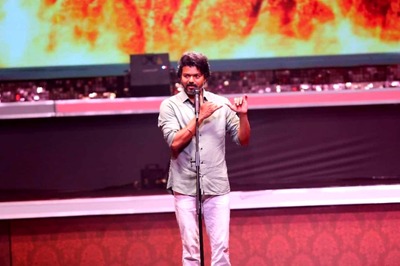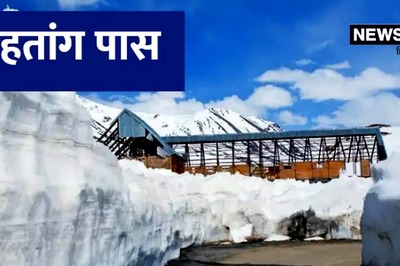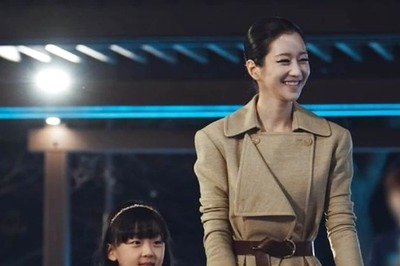
views
Architect of the BJP-PDP alliance government in Jammu and Kashmir, Ram Madhav speaks to CNN-News18's Shreya Dhoundial about the situation in the Valley. The BJP general secretary talks about the violence during the by-poll in Srinagar constituency, and justifies the controversial video in which armed forces are seen using a Kashmiri man as shield in front of their jeep. Edited excerpts:
Shreya Dhoundial (SD): The Kashmir Valley is on the boil once again and complicating matters are ministers in the government who are saying 'pathhar ka jawab bullet se dena chahiye'. Do you agree with such point of view?
Ram Madhav (RM): No... I disagree with this statement. The politicians better leave these matters to security forces. They know how to handle the situation. I disapprove of such public utterances by political leaders. Having said it, I agree with you that Kashmir situation is certainly troubling all of us.
SD: There is a battle of narratives going on in the valley. We have seen two videos play out over and over again on television screens. In one of these videos, a civilian is seen tied to the bonnet of an Army jeep as human shield. Do you think the young major responsible for this act should be punished?
RM: First of all, one has to understand the kind of situations our security forces face in the valley. In this particular case, the young major was left with two options. One was to allow the mob to lynch 50 civilians and closely equal number of security personnel there... allow the people to overpower them and do whatever they wanted. The other option was to indulge in indiscriminate firing because he had 10 personnel with him. He could have used them to indiscriminately shoot people and kill them.
I compliment the major for not allowing both these things to happen. In either scenario, there would have been huge loss of human life. He tried to avoid that. If I were to blame anybody today for that scenario, it would be those who were responsible for failing to send reinforcements when the situation was critical and it was informed to the seniors. The reinforcements could not reach in time. One can try and take a moral position on what he did was right or wrong. In a war and love, everything is fair.
SD: Are you suggesting that there is a war happening in Jammu and Kashmir?
RM: War-like situation emerges when 900 to 1000 people with heavy stones stand in the way, you are left with only two options. Go and crush them, indulge in some kind of killing spree, which that young major avoided. I will compliment him for the decision he took. He saved the lives of the people in the police station, the officials and also his own boys, while not allowing any civilian casualties.
SD: A lot of commentary on the social media all over the world has been on the human rights of the Kashmiris. What about human rights of the civilian who was used as human shield?
RM: Those who talk about human rights, everybody knows what they do all over the world. What America is doing, what Russia is doing… so let them stop giving lectures about human rights.
SD: These are not Americans and Russians. What about Indians voicing their opinion?
RM: No, since you used the phrase all over the world, I said we are not bothered about what world thinks about us today. We are bothered about saving the life of every single person in the Valley. In fact, I would say that this young major has protected the right to life of a large number of people, both who were in the police station, his boys, as well as the youngsters who were misled into indulging into stone pelting and all. He has protected the lives of the people, he has protected the human rights of the people. In the process, yes, he had to take one harsh decision which nobody wants. Who wants such a situation to be allowed to happen? Nobody wants it. But in order to protect the human rights of many more, if one person’s human rights are assumed to be violated or curbed, I think leave that judgment to the major.
SD: There are many retired Army Generals who have gone on record saying this one image will haunt the Indian Army for years to come. Do you agree?
RM: Fair enough. People can have different views. That was the instant reaction of many people, I know, when the video was flashed out. Flashed out in a very dramatic manner by irresponsible politicians, who always have become famous for being irresponsible on social media. When they flashed out those news items, there was immediate reaction by many well-meaning people also. But I am sure after understanding the whole situation, probably they will also revisit their own statements. Even otherwise, let them... I mean in a democracy everyone is entitled to his view.
SD: Is it fair to interpret that the government is backing the young major?
RM: Government is committed to maintaining peace. We do not want a dead body a day, which the militants want, which the Hurriyat wants. They only want it so that they can perpetuate their agitation in the valley. They are the real violators of human rights, they use people as human shields. Instead of questioning them, you are questioning a major who has saved the lives of many people in a very critical situation.
SD: In a second video, armed CRPF man were heckled, hit and kicked. But they didn’t respond. The narrative that has played out is that it was a great story of restraint. But is that the image you want to go out to the rest of the world about our armed forces?
RM: No, that image, that video shows the kind of unruliness that prevails in the valley. Let people understand that before making a judgment about what the major did is right or wrong. Let them understand that is the kind of unruliness, violent atmosphere that prevails in the valley. Again, in this case, I would say, I would partly blame those who have failed to provide the reinforcements when you have the responsibility of safely taking the ballet boxes (EVMs) to the district headquarters, you’d have enough security forces available to do that. And you have allowed the youth to mock the people, physically assault them. It is very unfortunate. Somewhere down the line, I blame our security establishment in its failure. Nobody can tolerate such things. But yes, we compliment the CRPF jawans in such a scenario that they preferred that 'my first priority is to protect democracy'.
SD: What is going on in the valley according to your assessment? You are the point person for the government of Jammu and Kashmir. Polling percentage of 7% and 2%. Young boys in school uniforms throwing stones at security personnel. Last year, you had said we were not prepared. This time too, the government is not looking more prepared. What is going wrong?
RM: Well, I said in the beginning itself that the situation in Kashmir is certainly a cause of concern for all of us. Not just for us in the ruling party. I think every right thinking Indian is concerned with what is happening in the Valley today. Remember, six to seven months ago we had Anantnag Assembly by-polls. We had 80% polling. Mehbooba won with more majority than her own father, Mufti Saheb used to get. That was the kind of climate 6 to 7 months ago. This after the stone pelting and all. But 6 months down the line, we are faced with a situation where we conducted the election in Srinagar with great difficulty, low percentage of polling. And today, the second phase of elections in Anantnag had to be postponed to sometime in May. There is definitely a change in the situation in the valley. Now we are the ruling party, we cannot go and blame somebody else. We are the ruling party (coalition) in the state. We are the ruling party at the Centre. We have to take the responsibility for it, and we have to try and improve the situation. I am telling you, to the people today, that we are committed to handling the situation in a manner that would not allow these separatists and their sponsors across the border to take advantage of it. We will handle it.
SD: You are saying very confidently that you will handle it, but where is the government? It was missing in action last time when violence broke out. It's missing this time as well. The situation in the valley is almost like civilians Vs the security forces. The political establishment, which should have been there taking stock of the situation, calming tempers down, is missing.
RM: I disagree with you, the PDP-BJP government in the state is trying its best to undertake a number of development projects so that people get benefit out of them. Also, trying to do its best to maintain law & order in the state.
SD: Aren't they failing miserably?
RM: I agree with you. I agree that's why I repeatedly said that somewhere down the line security establishment and the state government need to be more cautious, more proactive. We needed to do better there, we needed to do better to improve the situation. When Srinagar election happened, half of the central forces could not reach because of the landslides and road blockade at the Banihal Pass. With meager forces, the state government was forced to conduct the polls. There were situations that had led to this kind of an atmosphere in the valley that we have to take that into account. It's our responsibility we cannot run away, that is what I am saying we will do it.
SD: You were one of the architects of the alliance between the BJP and the PDP. Has the alliance become a liability now?
RM: Look, this whole question, is not about alliance or alliance government. There is a challenge to the Indian state, there is a challenge to Indian national unity and integrity. Whatever violence is happening in the state is not about the state government. If you are asking me as to whether the BJP-PDP state government has done enough to control the situation, I am ready to admit that we could have done better. We should do better and it is our responsibility. We can't blame anybody else because we are the ruling party. But if you ask me if it is a liability, I say no. We are together with a purpose, which is to provide good governance to the state. Our government, both the parties, are striving utmost to deliver. Situation is difficult but such situations have been there in the Valley so many times before.
SD: Some commentators are saying the situation is almost like the '80s when militancy began. Do you agree?
RM: Look, commentators can say anything. Those who are saying it is back to '80s probably would have not seen '80s at all. I am saying that in 2017, the situation is much different. Today, there is a large role of social media in promoting violence and separatism in the valley. We have to tackle that and this new-style stone pelting, which the youth have started using in the last 6-7 years also needs to be tackled differently. The whole purpose of the separatist leaders is that they just want one dead body a day, they use it to provoke more emotions and more violence. We have to maintain our calm, maintain our balance and still manage to control the situation.
SD: Is India losing the social media battle in the valley?
RM: No not at all, social media is a medium which cannot make you win or lose any situation on its own. It can complicate situations, it has the potential to complicate it. Are you suggesting that if we win on social media, we win over Kashmir? It does not work that way, social media plays a role of complicating your problem, which is happening in the valley today.
SD: And we have not been able to control it?
RM: We have to work proactively on the social media front. We have been discussing with the concerned ministries, concerned departments that we have to be more proactive but that is not going to decide whether you win or lose Kashmir.




















Comments
0 comment